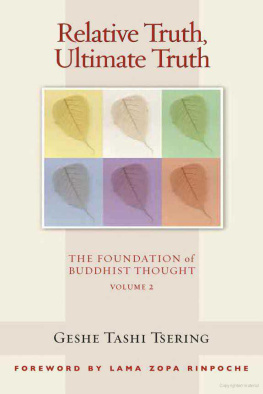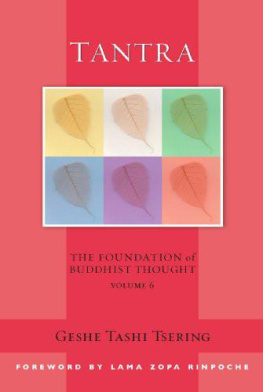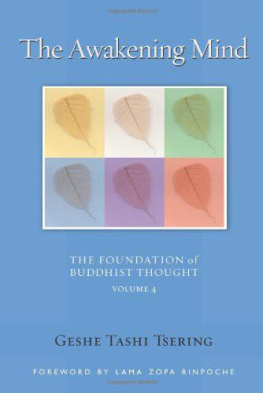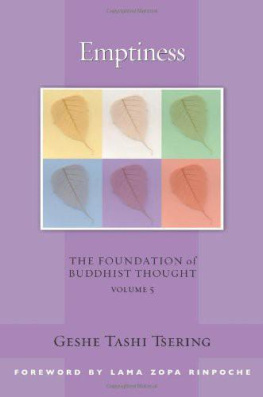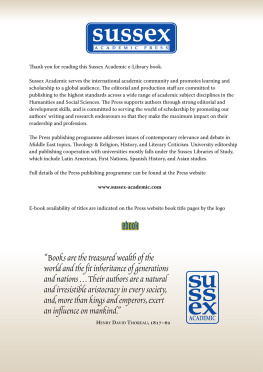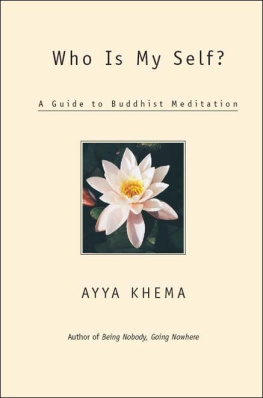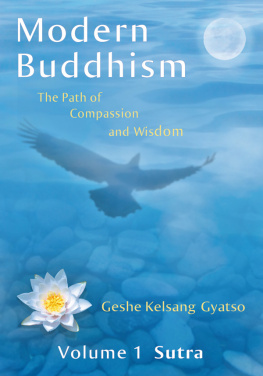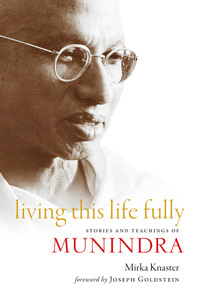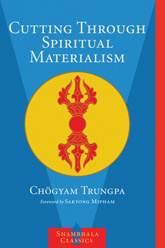Table of Contents
THE FOUNDATION OF BUDDHIST THOUGHT SERIES
1. The Four Noble Truths2. Relative Truth, Ultimate Truth3. Buddhist Psychology4. The Awakening Mind5. Emptiness6. Tantra

FOREWORD
THE BUDDHAS MESSAGE is universal. We all search for happiness but somehow fail to find it because we are looking for it in the wrong way. Only when we start cherishing others will true happiness grow within us, and so the Buddhas essential teaching is one of compassion and ethics, combined with the wisdom that understands the nature of reality. The teachings of the Buddha contain everything needed to eliminate suffering and make life truly meaningful, and as such the teachings are not only relevant in todays world but vital.
This is the message that my precious teacher, Lama Thubten Yeshe, gave to his Western students. His vision to present the Dharma in a way that is accessible and relevant to everyone continues and grows. His organization, the Foundation for the Preservation of the Mahayana Tradition (FPMT), now has centers all over the world, and Lamas work is carried on by many of his students.
The Foundation of Buddhist Thought , developed by Geshe Tashi Tsering, is one of the core courses of the FPMTs integrated education program. The essence of Tibetan Buddhist philosophy can be found within its six subjects. The Foundation of Buddhist Thought serves as a wonderful basis for further study in Buddhism, as well as a tool to transform our everyday lives.
Geshe Tashi has been the resident teacher at Jamyang Buddhist Centre, London, since 1994. He has been very beneficial in guiding the students there and in many other centers where he teaches. Besides his profound knowledgehe is a Lharampa geshe, the highest educational qualification within our traditionhis excellent English and his deep understanding of his Western students means that he can present the Dharma in a way that is both accessible and relevant. His wisdom, compassion, and humor are combined with a genuine gift as a teacher. You will see within the six books of the Foundation of Buddhist Thought series the same combination of profound understanding and heart advice that can guide beginners and experienced Dharma practitioners alike on the spiritual path.
Whether you read this book out of curiosity or as a part of your spiritual journey, I sincerely hope that you find it beneficial and that it shows you a way to open your heart and develop your wisdom.
Lama Zopa Rinpoche
Spiritual Director
Foundation for the Preservation of the Mahayana Tradition
PREFACE
THE SUBJECT OF THE SECOND of the Foundation of Buddhist Thought series is the two truths of relative and ultimate truth. This is a subject I encountered when I was a young monk in the monastery and as an enthusiastic debater I was immediately fascinated by it. It soon became clear to me, however, that this was much more than just something philosophical, something to challenge a young mind; this was something incredibly relevant to my daily life. To see how there is a mismatch between the reality of how things exist and how we perceive they exist, and to see how these two levels of conventional and ultimate reality are intertwined in every thing we do, can bring a richness to our lives and has the potential to really help us out of our problems. Once I saw this, I was hooked.
From that time on I have been amazed at how many different ways these two truths operate in our lives. It is not as if one is a purely theoretical debating point or the other is pure fantasy; both function on their particular level. On the conventional level, my life, like all our lives, has its share of joy, fulfillment, pain, and challenges, all tied together through the ever-evolving chains of cause and effect that dominate what I do and who I am. All this is real. It is real because I experience it and because I see it operating within the lives of everyone I encounter: my friends, my family, my colleagues. On a relative level, I need to work on what skills I have to make the best of the circumstances I meet everyday in order to have as peaceful and calm a life as possible.
But to really be effective at this I need to understand what is happening at a deeper level. Beyond the conventional causal dependencies that rule our lives, there is a fundamental mode of existence that all things and events share; that is ultimate truth. At this level all things melt into the same taste beyond diversity. I find it utterly fascinating that beyond the myriad things that make up our universe there lies this deeper level of reality, one where there is no diversity, no difference. To come to even a very superficial understanding of this is, I think, a huge help in seeing how and why things happen in the way they do, and so start to be able to overcome the difficulties we now face.
And so I think the two truths are a vital part of the spiritual journey we must all undertake if we want to rise above the confusion and pain of this world. Based on these two levels of reality the entire Buddhist practice is developed. It is extremely clear, for example, that we need an understanding of the two truths if we want to really understand the Buddhas first teaching, the four noble truths, and if we want to take the first serious step as a Buddhist by taking refuge. As His Holiness the Dalai Lama said in The Four Noble Truths :
Only when you have an understanding of the nature and relationship of these Two Truths are you in a position to fully understand the meaning of the Four Noble Truths. And once you understand the Four Noble Truths, then you have a sound foundation on which to develop a good understanding of what is meant by Taking Refuge in the Three Jewels.
He is echoing the words of so many of the great teachers that have gone before him, like the great Indian masters Nagarjuna and Chandrakirti. Actually the two truths is not just a vital subject within Buddhism, but also in the non-Buddhist philosophical traditions. So many philosophies try to explain the disparity between how things exist and how we ordinary people perceive them to exist, and emphasize how vital this understanding is in solving our problems.
When I first prepared The Foundation of Buddhist Thought as a series I seriously contemplated making the two truths the first topic to be covered, as this is the right and proper sequence of any spiritual path. I was very concerned however that as an introduction to Buddhism it might seem too abstract and dry, and so I have made this the second book. Far from being abstract and dry, though, I find this subject is so rich, and I hope you will come to share my enthusiasm for it.
The two truths is probably my favorite subject but that doesnt mean that I understand it, especially as presented by the highest school, Prasangika. There is still a long way to go, and even these days I ask questions, by phone or on a cassette, of my own wonderful teacher, Geshe Thubten Renchen, who has taught me since my first days in the monastery and is still immensely kind and helpful. And many other great teachers like His Holiness the Dalai Lama have helped me to understand this topic in many different ways. For all of them I have great admiration and a deep feeling of closeness. There is no way I could repay their kindness, even over many lifetimes, but I would like to take this opportunity, with deep respect and hands folded at my heart, to thank all these great teachers, who have helped me understand the amazing teachings like the two truths.
With my lack of understanding, Im sure there are many mistakes, and this book is quite elementary compared with the other profound works on the subject, but I sincerely hope it will help you in some way. As such, I would like to encourage you to share my enthusiasm for the two truths and to read it with as open a mind as possible.
Next page
